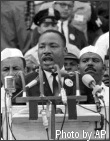With sheer reluctance, President Reagan in
1985 signed a bill into law making the third Monday of January a national
holiday celebrating the birth and life of Dr. Martin Luther King, Jr.
I remember quite vividly Reagan's accusation charging Dr. King with
being a "communist" sympathizer, and lamenting that America
need not pay homage to a seditionist figure.
Those were Reagan's thoughts on Dr. King and I suspect they remain the
same as he lives in recluse in Orange County, California.
Reagan's opposition toward commemorating Dr. King's national and global
humane contributions, lie deeply in his staunch conservative right-wing
philosophy. Reagan's push to dismantle many of the Civil and Human Rights
factors Dr. King lost his life over continues to be at the center of
the
current (select) President George W. Bush administration. Dr. King did
not die from natural causes. He was assassinated because of his lifestyle.
His birth is significant, but even more so, Dr. King's fight against
racial
injustices and inequality outweighs simply having a "day off" on
Monday.
The permeating legacy of racism, sexism, and economic exploitation in
America necessitates active involvement by individuals and organizations
committed to eradicating racial discrimination and other forms of xenophobic
practices across the American cultural landscape. To understand many of
the contemporary paradigms of racial and economic injustices in this nation,
one must put it in context-both the historical context in which it formulates,
and the ongoing social context that warrants it.
The entire first epoch of American economic development was based on the
exceptionally vicious and morbid profitable exploitation of African and
African American slave labor. These features of America's economic development
gave credence to sophisticated systems of economic, social, political,
and legal discrimination and ideological self-justification. With the
end of slavery and the national union secured by the Civil War, a period
igniting a series of massive militant racially integrated labor forces
coincided with efforts made possible by the Radical Reconstruction.
The response to this integrated workers' revolution with African Americans
workers, led to the ruling class mandating a system of Jim Crow segregation.
Its primary institute was built against African American liberation from
White Supremacy. The impact of Jim Crow laws was enormous to say the least.
It divided and conquered the poor and created an exclusive parameter that
kept African Americans out of trade unions, public accommodations and
denied due process protection granted by the Fourteenth Amendment. Today,
the social ramification of slavery and Jim Crow laws are evident all across
African America. Dr. King's struggle for racial justice and global peace
is incomplete. As we observe this great man of God, whose vision for a
better America shook its very foundation, remember that there is much
work to be done.
Curtis M. Keyes, Jr., is a graduate student in Political Science at Roosevelt University in Chicago, IL. The opinions expressed are those of the author and are used by permission.



